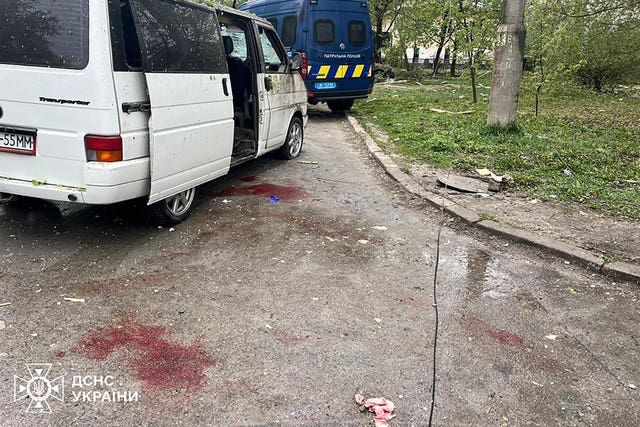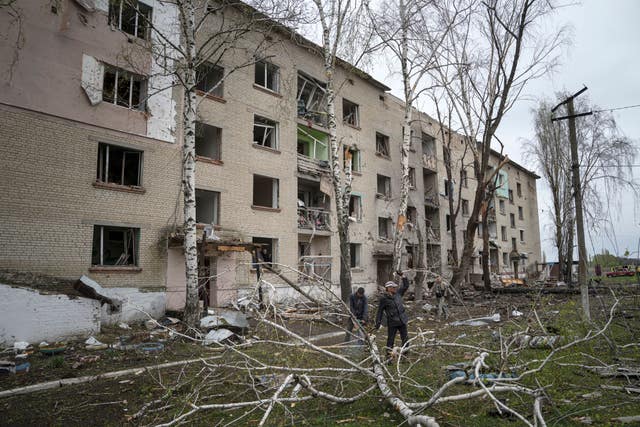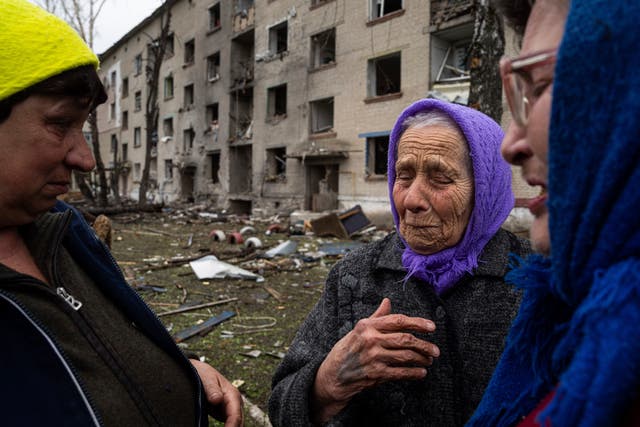Three Russian missiles slammed into a central area of the northern Ukrainian city of Chernihiv on Wednesday, hitting an eight-storey apartment building and killing at least 17 people, local officials said.
At least 61 people, including three children, were wounded in the morning attack, Ukrainian emergency services said, as rescue workers searched through partially demolished buildings and tall mounds of rubble.
Chernihiv lies some 90 miles north of the capital Kyiv, near the border with Russia and Belarus, and has a population of around 250,000 people.

Through the winter months, Russia made no dramatic advance along the 620-mile (1,000km) front line, focusing instead on attritional warfare.
However, Ukraine’s shortage of artillery ammunition, troops and armoured vehicles has allowed the Russians to gradually push forward, military analysts say.
A crucial element for Ukraine is the hold-up in Washington of approval for an aid package that includes roughly 60 billion US dollars (£48.2 billion) for Ukraine. House Speaker Mike Johnson said on Sunday that he will try to move the package forward this week.
Ukraine’s need is now acute, according to the Institute for the Study of War, a Washington-based think tank.
“The Russians are breaking out of positional warfare and beginning to restore manoeuvre to the battlefield because of the delays in the provision of US military assistance to Ukraine,” the ISW said in an assessment late on Tuesday.
“Ukraine cannot hold the present lines now without the rapid resumption of US assistance, particularly air defence and artillery that only the US can provide rapidly and at scale,” it said.

The first shells are due for delivery in June.
The 27-nation EU promised a year ago to send Ukraine on million artillery shells, but the bloc was unable to produce that many.
Ukrainian President Volodymyr Zelensky has pleaded with Western countries to provide his country with more air defence systems.
He said of the Chernihiv strike: “This would not have happened if Ukraine had received enough air defence equipment and if the world’s determination to counter Russian terror was also sufficient.”
He told PBS in an interview broadcast earlier this week that Ukraine recently ran out of air defence missiles while it was defending against a major missile and drone attack that destroyed one of Ukraine’s largest power plants, part of a recent Russian campaign targeting energy infrastructure.
Ukrainian forces are digging in, building fortifications in anticipation of a major Russian offensive that Kyiv officials say could come as early as next month.
Ukraine is using long-range drone and missile strikes behind Russian lines which are designed to disrupt Moscow’s war machine.

About an hour before that Mordovia attack, Russia’s civil aviation authority halted flights at airports in two of the country’s largest cities, Nizhny Novgorod and Tatarstan’s Kazan, because of safety concerns.
Also, unconfirmed reports said a Ukrainian missile struck an airfield in occupied Crimea.
Neither Russian nor Ukrainian officials confirmed the strike, but local authorities temporarily closed a road where the airfield is located.
Russian news agency Tass quoted the local mayor as saying windows in a mosque and a private house in the region were shattered in a blast there.
Ukrainian drone developers have been extending the weapons’ range and earlier this month struck a target some 745 miles (1,200km) east of Ukraine.






